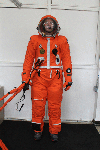DIY Space Suit Chosen For Suborbital And Supersonic Flights
Your essential travel wear for near-space jaunts
![The metal neck ring of the second-generation (2G) space suit proved uncomfortable for a wearer while lying down, so Southern [right] and Moiseev [left] plan to integrate a helmet with a flip-up visor into the 3G suit.](https://www.popsci.com/uploads/2019/03/18/W5OBXZF4AQTPCVELOJR4AWCBEE.jpg?auto=webp)

Tourists, no need to worry about picking an outfit for your suborbital flight—this flexible, comfortable suit has you covered. Final Frontier Design (FFD), a private design firm based in Brooklyn, has partnered with Starfighters Aerospace to further develop and optimize its 3G space suit for intra-vehicular activity (meaning launch, re-entry, and cabin activities) on Starfighters’ F-104 supersonic jets that also fly suborbital missions. The sleek, single-layer 3G suit won a Popular Science Invention Award in 2013. Currently, Starfighters’ jets only go on research and training sessions, but commercial flights aren’t too far away.
Traveling to space was once an experience reserved for selected astronauts only. With Virgin Galactic recently cleared by the FAA for commercial space flights, a recreational trip to the vacuum is no longer an unreachable dream. But tourists, who pay big money for their tickets to space, have thus far had limited space suit options. Most modern suits are heavy, bulky, and expensive—about $200,000 each.
![The metal neck ring of the second-generation (2G) space suit proved uncomfortable for a wearer while lying down, so Southern [right] and Moiseev [left] plan to integrate a helmet with a flip-up visor into the 3G suit.](https://www.popsci.com/uploads/2019/03/18/W5OBXZF4AQTPCVELOJR4AWCBEE.jpg?auto=webp&optimize=high&width=100)
Fit For Space Teaser
Since meeting at a 2007 astronaut glove design competition, costume fabricator Ted Southern and space-suit builder Nikolay Moiseev have worked together to build lightweight, reliable, and relatively cheap space suits for suborbital flights. The duo launched a Kickstarter campaign—successfully funded in July 2012—to help them complete a prototype for the 3G space suit, which has passed NASA’s flight certification test.
FFD has received three NASA contracts to continue development of the single-layered pressurized suits. With the new Starfighters Aerospace deal, FFD will have the chance to test its 3G suit on the largest commercially available supersonic jet. “If our suits can work in the cockpit of an F-104, they can work in most any space vehicle as well,” Southern said in a statement.